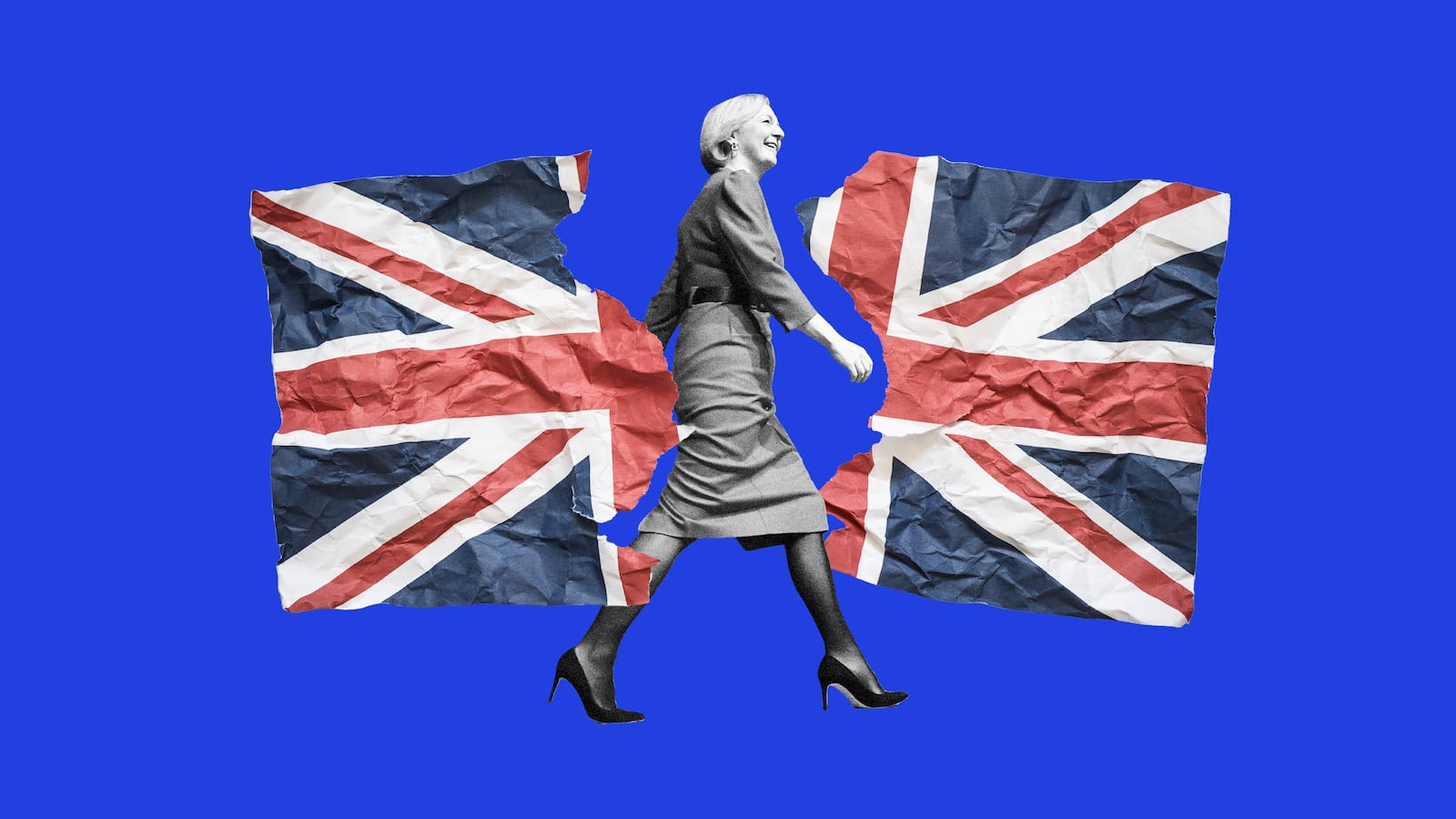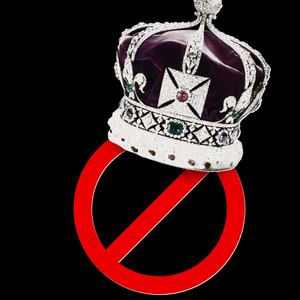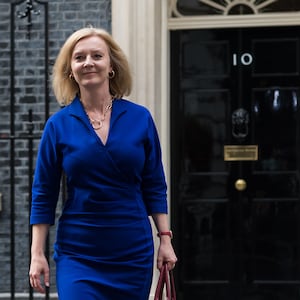Britain’s version of a parliamentary democracy, at present, looks risible. In Liz Truss, it has produced the most inane prime minister in its history.
In just seven weeks the prime minister has lost all credibility. She staked her future—and the country’s—on an economic plan so ill-conceived that it was virtually dead on arrival. She mindlessly repeated a mantra that she would “deliver,” but is left with nothing to deliver. Most members of her Tory party believe she has doomed them to an election wipe-out. And in a damning editorial, The Economist said she had the shelf life of a head of lettuce.
The Tories were once thought of as the party that enjoyed a permanent majority because of their fiscal prudence and all-round competence. Truss destroyed that. In a matter of days, the new chancellor of the exchequer, Jeremy Hunt—striding through Whitehall with the confident independence of an adult scolding a wayward child—junked the whole Truss doctrine.
But if this fiasco produces any lesson at all—it’s a reminder of what happens if you allow ideological minorities to choose a nation’s leaders.
Both the American and British systems suffer from the conceit that they are exceptional as democracies, and yet both have been seriously weakened by transferring decisive powers from a popular majority vote to an unrepresentative minority.
In America, that bias is imposed by the electoral college, which produced the largest-ever disparity in 2016, when Hillary Clinton won 2.8 million more popular votes than Donald Trump and yet lost. In the United Kingdom, the disparity was even more huge. Truss’ victory was decided by a hard core of 141,000 Tory party members (less than 0.3 percent of the national electorate) of whom just 81,000 voted for her.
In both cases, the system produced winners who courted the most reactionary blocs of their parties.
To be sure, the Tories look like pussycats compared to the Republicans—a party that engineered a Supreme Court which currently acts like the enforcer of a theocracy. But Truss rode into office as an evangelist of Brexit, which was essentially driven by a combination of xenophobia (aversion to anyone on the other side of the English Channel) and racism (fear of the ascendancy of immigrants).
Both systems are now jeopardized by the quality of the political leaders they produce—and, crucially, by the difficulty of removing a leader when they are found to be unfit. In the U.S., not only does it appear that there is no viable mechanism to remove a president once found to be unfit for office, but there is a strange willingness to endure it, whatever the cost. In Britain, three Tory prime ministers have already been ejected by their party over the past six years and, following an inexorable law of diminishing returns, each new one turned out to be worse than their predecessor.

Truss is a cynical chameleon who assumed the voice of whatever faction was likely to speed her ascent. Her earliest political allegiance was to the Liberal Democrats (and to the far left wing of that party), supporting the legalization of cannabis and the abolition of the monarchy.
She junked those beliefs in 1996 when she joined the Tory party. She was elected a member of parliament in 2010 when, under prime minister David Cameron, the Tories rebranded themselves as socially progressive and formed a ruling coalition with the Liberal Democrats. Truss rose through the ranks, becoming a junior cabinet minister in 2014, without showing any strong ideological convictions. Before the Brexit referendum she supported remaining in the European Union, saying “it is in Britain’s economic interest and means we can focus on vital economic and social reform at home.”
But, as soon as the result was in, she switched and began courting hardline anti-Europeans in the party. Finally, this undid her. She became a facsimile of the people who elected her as leader, stubborn and isolated with no clue about finding a way forward.
Lacking any background in economics, Truss fell under the influence of right wing ideologues touting the simplistic nostrum of unfunded tax cuts that would magically boost growth, an echo of Reagan-era “trickle down” doctrine. Business leaders, bankers, and the International Monetary Fund warned that this was a foolhardy course and, sure enough, when she revealed her plans, the pound sterling plummeted and interest rates soared. Truss’ response was to invent a non-existent “anti-growth coalition” that was plotting against her.
That didn’t wash and, with the markets in chaos, to save herself, she sacked the man who had been her close partner in devising the policy, chancellor of the exchequer Kwasi Kwarteng.
One former cabinet minister told the Financial Times: “She has fucked the party, fucked the country and fucked our prospects at the next general election.”
Members of Parliament, uncoupled from the leadership selection process, shared the mood of an electorate already angry about living with the consequences of political choices made without their participation. And that’s why the parliamentary party is showing no mercy toward to her now, and why she resembles a dead leader walking.

Having survived a weekend when her future was being counted in hours, Truss appeared defiant. She even said she would lead the party into the next election, which, given their abject position in the polls, was a bit like saying that they should all go down together. (They should all go down together. In any case, it’s a poisoned chalice for whoever grabs it.)
The cabinet began to unravel Wednesday, when Suella Braverman, the home secretary (one of the largest departments of government, responsible for the police and national security) resigned, saying in a letter to Truss that “pretending we haven’t made mistakes and hoping that things will magically come right is not serious politics.”
It is tempting to see this all as black comedy, just another performative cycle in the life of a series of clowns who have shredded British politics of any claim to seriousness. But this is not a local fiasco. If the British economy tanks, the world’s financial system will also face the consequences.
But is Britain’s lamentable political state also something much worse, a fundamentally broken parliamentary democracy? In the short term, there is no remedy without pain. The problem is, how evenly shared will the pain be?
Britain faces the same pressures as the rest of Europe—including high inflation and soaring energy costs, partly as a result of the Ukraine war. But without the collective resources of the European Union, the British people are left with the consequences of Brexit, which has proved to be an unworkable panacea for what ails the nation—a mindset identified as long ago as 1962, when Dean Acheson, a former U.S. secretary of state, warned: “Britain’s attempt to play a separate power role—that is a role apart from Europe, a role based on a ‘special relationship’ with the United States…this role is about played out.”
Nonetheless, Britain’s democracy has some advantages over America’s. The U.K.—unlike the U.S.—is not threatened by an armed insurrection, a political party that won’t accept an election result that goes against it, or the prospect of an authoritarian leader swept to power on a tide of white supremacism.
Instead, the Brits will bumble on, until the people get a chance, by means of a general election, to get rid of a party that cannot deliver professional governance.
Awaiting a new Labour government, beyond the immediate economic meltdown, there is the threat that the coherence of the United Kingdom, a political settlement dating from the early eighteenth century, will be destroyed by the independence movements in both Scotland and Ireland. Those would be the most destructive costs of Brexit.
Or, perhaps, the country will slowly come to terms with the idea that if you let the Little Englanders get the upper hand, what you end up with is Little England. And that would be catastrophic.









